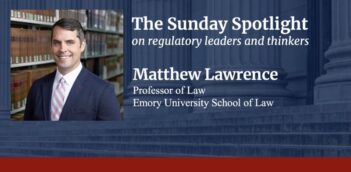
Government antitrust actions do not work in a high-technology market in which big businesses prove more efficient.
The Biden transition team has a lot to do before inauguration day.
Its most important task is to choose nominees to run agencies who can restore the agency cultures and reputations that the Trump Administration severely damaged. Its second most important task is to prepare to rescind the hundreds of interpretative rules, policy statements, and executive orders that the Trump Administration issued in its efforts to eviscerate government regulation.
The U.S. Supreme Court has made that task more labor intensive by requiring agencies to give reasons for rescinding rules of all types. Once it has completed those critical tasks, the Biden Administration will need to address other important questions such as what, if anything, it should do about the market power of platform firms like Google, Amazon, Facebook, and Apple.
The Biden Administration should dismiss the antitrust case the Trump Administration filed against Google and resist the pressure to bring similar cases against the other platform firms. We have been down this road before. Nothing good lies at the end of the road.
In 1969, the U.S. Department of Justice filed a complaint against IBM in which it alleged that IBM violated Section 2 of the Sherman Act by monopolizing the market for computer hardware and software. IBM had 70 percent of the market at the time. In 1982, the Justice Department moved to dismiss the case as without merit. After hearing the testimony of 974 witnesses, the Justice Department was unable to prove that IBM caused any harm to consumers. During the pendency of the case, IBM steadily lost market share. By 1982, it had only 37 percent of the market—well short of monopoly power. IBM’s competitors had used a combination of technological innovation and entrepreneurial energy to accomplish what the government utterly failed to accomplish in its lengthy and expensive antitrust action.
Similarly, in 1994, the Justice Department filed a complaint against Microsoft in which it alleged that Microsoft violated Section 2 of the Sherman Act by monopolizing the market for computer operating systems. Microsoft had more than 95 percent of the market for operating systems at the time. The Justice Department subsequently settled the case. It filed a separate complaint against Microsoft in 1998 alleging an antitrust violation in how the company bundled its internet browser. In 2001, the unanimous en banc U.S. Court of Appeals for the District of Columbia Circuit gave the government a victory on one of its theories—that Microsoft had used bullying tactics to preserve its monopoly in the market for search engines. The court rejected the government’s core argument, however, that Microsoft had illegally tied its operating system to its internet browser. Most important, the court made it clear that the government had no chance of obtaining the remedy it sought—the breakup of Microsoft into two firms. A few months later, the Justice Department settled this second case—it had no choice but to acquiesce in a few largely ineffective conduct-based remedies.
And now, in 2020, the Justice Department filed a complaint against Google in which it alleged that Google violated Section 2 of the Sherman Act by monopolizing the market for search engines. Notably, Google had 0 percent of the market for search engines when the Justice Department filed its action against Microsoft based on the same theory. Since Google was founded in 1998, the company has grown to the point that today it has about 90 percent of the U.S. market for search engines, while Microsoft’s share is only about 6 percent of the market. The two young entrepreneurs who founded Google used a combination of technological innovation and entrepreneurial energy to accomplish in the dynamic market what the government had utterly failed to accomplish in its antitrust action.
Antitrust law does not perform well in the context of the complicated technologies and marketing techniques that are employed in today’s extremely dynamic markets. Markets change rapidly, while complicated antitrust cases take many years to litigate. After devoting a high proportion of its scarce resources to the IBM and Microsoft cases for over 20 years, the Justice Department was unable to prove that either IBM or Microsoft injured consumers.
The government will experience a similar failure in its case against Google if it is foolish enough to continue to pursue the case. It is easy to prove that firms such as IBM, Microsoft, and Google injure their smaller, less efficient competitors. But consumer welfare increases significantly when efficient firms drive less efficient firms out of business.
By contrast, we know with certainty that price-fixing cartels cause massive harm to consumers. For instance, during the period in which it unsuccessfully attempted to prove that Microsoft was causing harm to consumers, the Justice Department successfully exposed, ended, and punished an international vitamin cartel that was costing consumers many billions of dollars per year.
The Justice Department can serve the country better by devoting its scarce resources to efforts to detecting, deterring, and punishing price-fixing cartels rather than to futile attempts to prove that firms that have enjoyed great success by luring consumers away from their less efficient competitors have somehow harmed consumers.
For many decades, antitrust law has been interpreted to require agencies and courts to maximize consumer welfare. Most critics of the platform firms are well aware of the futility of any attempt to prove that they harm consumers. That is why they propose major amendments to the Sherman Act, including elimination of consumer welfare as the goal of antitrust law, as a critical step in their campaign to rein in the power of the platform firms.
As Herbert Hovenkamp has explained, the changes in the Sherman Act that the platform critics propose are economically indefensible. They would harm the performance of the economy. Without major changes in antitrust law, it would be a waste of scarce resources to attempt to prove that the platform firms injure the consumers who strongly prefer them over their less efficient competitors.
The Biden Administration will have to exhibit extraordinary political courage to follow my advice. Americans of both parties and all ideologies have long favored small firms over large firms based on their belief that small firms account for most of what is good in the country and that large firms account for most of what is bad in the country. Yet as I and others have noted elsewhere, a voluminous body of studies has exposed that belief as totally unsupported, even mythical. Perhaps public opinion will catch up with reality at some future time, but we are not there now.
When is the last time you heard a politician brag that they did something good for big business? As long as the myth persists, all politicians will be under intense pressure to try to use antitrust law to protect inefficient small firms from more efficient large firms. But it is a waste of scarce government resources to go after Google. The Biden Administration should drop the case.




